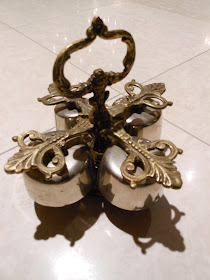So, I've used this joke before--and even on this feast--but it works so well and still gets laughs!
Blessings on all of your families...
The Holy Family of Jesus, Mary, & Joseph C
A
Sunday school teacher wanted to make sure
that her young class understood
that her young class understood
that
Jesus wasn’t just a made-up story,
but
is real and living even now.
So
she asked her students, “Where is Jesus today?”
Stevie
raised his little hand and said, “He’s up in heaven.”
Maggie
was next called upon and answered, “Jesus lives in my heart.”
Jake was waiving his hand furiously in the back of the room.
Jake was waiving his hand furiously in the back of the room.
“I
know! I know!” he blurted
out. “Jesus is in our bathroom!”
The
whole class got very quiet.
His
teacher gathered her wits, swallowed hard,
and
asked Jake how he knew such a thing.
“Well,”
he said, “every morning my father gets up,
bangs
on the bathroom door, and yells,
‘Good
Lord, are you still in there?’”
the
childhood home
of Pope Benedict XVI
was
turned into a small museum
in his native Bavaria.
During
the course of renovations,
a
Christmas letter was discovered,
handwritten
by a seven-year-old boy
back in 1934.
The
letter was just put on public display
for the first time;
translated,
it reads:
Dear Christ Child!
Come quickly down to earth.
You will bring joy to
children.
You also will bring joy to
me.
I would like a prayer book
for Mass,
a green Mass vestment,
—he
and his brother, Georg,
liked to "play church"—
and [an image of] the heart of
Jesus.
I will always be good.
Greetings from
Joseph
Ratzinger.
Clearly,
the Catholic faith
had
a central place in the Ratzinger household.
As
that Sunday school teacher asked:
Where
is Jesus today?
What
place does the good Lord have in your family’s life?
Parents
have an essential role
in
shaping the religious imagination and identity of their children.
That’s
an amazing power and an awesome responsibility. (cf. R. Smith)
(And while I say it belongs to “parents,”
I’m thinking of grandparents and godparents, older siblings,
Mary
and Joseph were diligent
in
passing on their most deeply held values—
especially
their religious tradition—to their Son.
Likewise,
regularly coming here, to the Lord’s temple,
as
a family for Mass
is
at the heart of Catholic family life;
for
it, there can be absolutely no substitute.
But
things mustn’t stop even there.
Jesus went down with them to
Nazareth,
and was obedient to them.
It
takes real discipline to raise disciples:
to
not only instruct them in the truths of our faith,
but
to also inspire them to lovingly and faithfully
live
out God’s commandments.
Nothing
teaches children more
than
the example—good or bad—of their parents.
don’t
have to worry about raising a future Pope…
…but
we should all be trying to raise future saints.
Headlines
these days can make us wonder
how
well we’re doing in this arena.
Yet
I was touched and encouraged by a small scrap of paper
I
found on the church floor after Mass late on Christmas Eve.
First,
in the clear handwriting of an adult, it reads:
Dear Jesus
I Love you
God I Love you
And
then in the large, shaky letters
of
a child imitating Mom or Dad, it says,
GOd I LovE
It
really is that simple!
And
that’s what it’s all about.
Using
all the means at our disposable,
we must
constantly strive to make sure our youngsters
never
lose sight of Jesus,
as
did Mary and Joseph those three anxious days in Jerusalem.
Let’s
instead make sure that our children know
that
God’s Only Begotten Son,
who
came down from heaven to earth at Christmas,
dwells
with us still.
They
can always find him here:
in
the church, in the Eucharist.
May
they also learn from us
how
to find the good Lord at home,
in
all the twists and turns of family life—
maybe
even in the morning wait for the bathroom.























